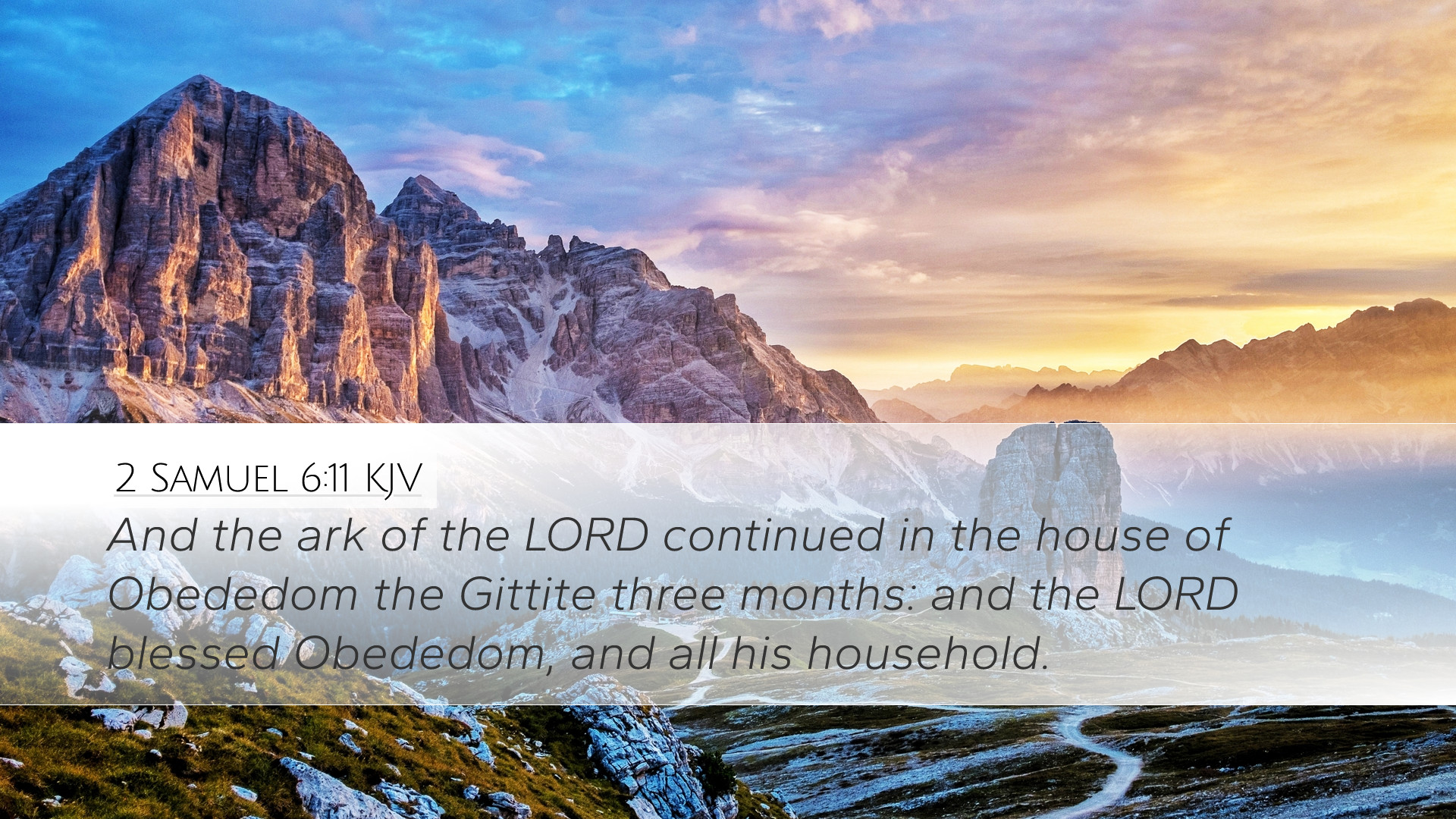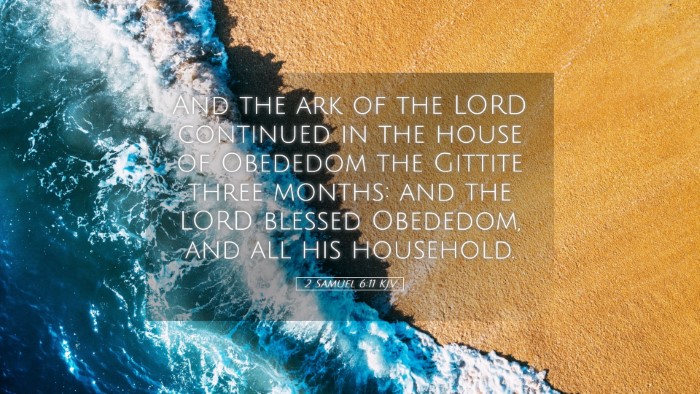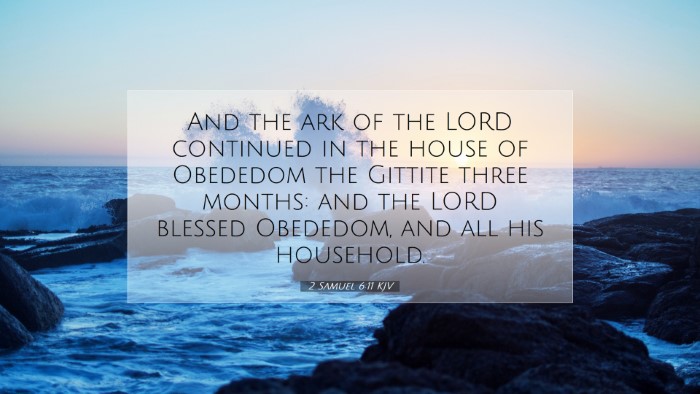Bible Commentary on 2 Samuel 6:11
2 Samuel 6:11 states:
"And the ark of the LORD continued in the house of Obed-edom the Gittite three months: and the LORD blessed Obed-edom, and all his household."
Context and Significance
This verse captures a significant event during King David's effort to bring the Ark of the Covenant to Jerusalem. The ark represents God's presence, His covenant, and His guidance for the people of Israel. The failure during its initial transport due to Uzzah's irreverent act (2 Samuel 6:6-7) leads to a temporary resting place in the home of Obed-edom.
Insights from Public Domain Commentaries
Matthew Henry's Commentary
Matthew Henry emphasizes the lesson of humility and reverence in approaching God's holy objects. He notes that the tragedy surrounding Uzzah demonstrates God's holiness and the seriousness of honoring Him. In contrast, the blessing upon Obed-edom illustrates God's mercy and favor to those who fear Him. Henry recounts that Obed-edom, a Levite, likely understood the divine nature of the Ark and treated it with the reverence it demanded. His blessings serve as a reminder that God’s presence can yield abundant blessing when approached with the proper heart.
Albert Barnes' Commentary
Albert Barnes draws attention to Obed-edom’s background as a Gittite. He suggests this man exemplifies how God’s blessings are not confined to the Israelites alone but extend to all who honor Him. The household of Obed-edom experiences divine favor, which reflects God's ability to bless outside the perceived boundaries of His chosen people. Barnes stresses that this event serves as a precursor to the eventual establishment of the Ark in Jerusalem, highlighting God's overarching plan for Israel and the gentiles alike. The three months of fulfillment in Obed-edom’s life serves as both a testing period and a testament to the transformative power of God's presence.
Adam Clarke's Commentary
Adam Clarke elaborates on the physical and symbolic importance of the Ark. He points out that the Ark was a container of the covenant and a signifier of God’s guidance. Clarke remarks on the nature of blessings bestowed upon Obed-edom and his household, interpreting these blessings not merely as material gain but as a holistic flourishing of life—spiritually, physically, and socially. He indicates that Obed-edom's life stood in stark contrast to the fear and dread experienced by those who mishandled the Ark. The blessings seen in his household could symbolize the restorative and transformative nature of God's covenantal grace, fostering an environment conducive to obedience and prosperity aligned with His will.
Theological Reflections
The narrative surrounding 2 Samuel 6:11 invites several theological reflections for pastors and theologians alike. The primary insight is the highlighting of God’s holiness juxtaposed with His grace. The failure of Uzzah serves as a stark reminder of the reverence due to God and the consequences of violation of His commands. Conversely, the blessings on Obed-edom exemplify the hope that God's presence brings.
-
The Nature of Divine Blessing:
The blessings received by Obed-edom indicate that divine favor is intricately linked to the acknowledgment and reverence of God. It indicates a covenantal relationship, where recognizing God’s holiness leads to genuine blessing.
-
Inclusivity of God’s Salvation:
Obed-edom teaches that God is not limited by heritage but is willing to bless anyone who honors Him. This anticipation of multi-ethnic inclusion prefigures the ultimate fulfillment seen in the New Testament with the Great Commission.
-
Response to God’s Presence:
The varied responses to God’s presence—the fear of the Israelites versus the blessing on Obed-edom—prompt a reflection on how communities respond to the Divine. Pastors can challenge congregations to embrace God's presence with reverence and joy, leading to communal blessings.
Application for Ministry
The implications of 2 Samuel 6:11 extend beyond historical narrative into practical applications for ministry. Pastors can draw upon this text when teaching about the nature of holiness, divine blessing, and community response to God's presence.
-
Encouragement in Trials:
Like Obed-edom, individuals and families may encounter trials but can seek God’s presence for peace and blessings. Ministers can provide pastoral care by encouraging families to embrace God's presence amidst struggles.
-
Teaching on Holiness:
This passage can serve as a platform for teaching about worship and reverence in God’s presence, highlighting the importance of approaching Him with appropriate respect and honor.
-
Community Outreach:
The narrative invites congregations to consider their witness to outsiders, much like God's blessing extended to Obed-edom. Churches can engage in outreach that demonstrates God's inclusive grace, welcoming all to experience His blessings.
Conclusion
In summary, 2 Samuel 6:11 encapsulates profound theological truths about God’s holiness, mercy, and the nature of blessings. The examples of Uzzah and Obed-edom serve as contrasting figures in understanding our posture before God. For scholars and pastoral leaders, this verse is a reminder to guide communities toward a deeper reverence for God’s presence, ensuring that their worship is grounded in an acknowledgment of His greatness and a commitment to live according to His ways.


